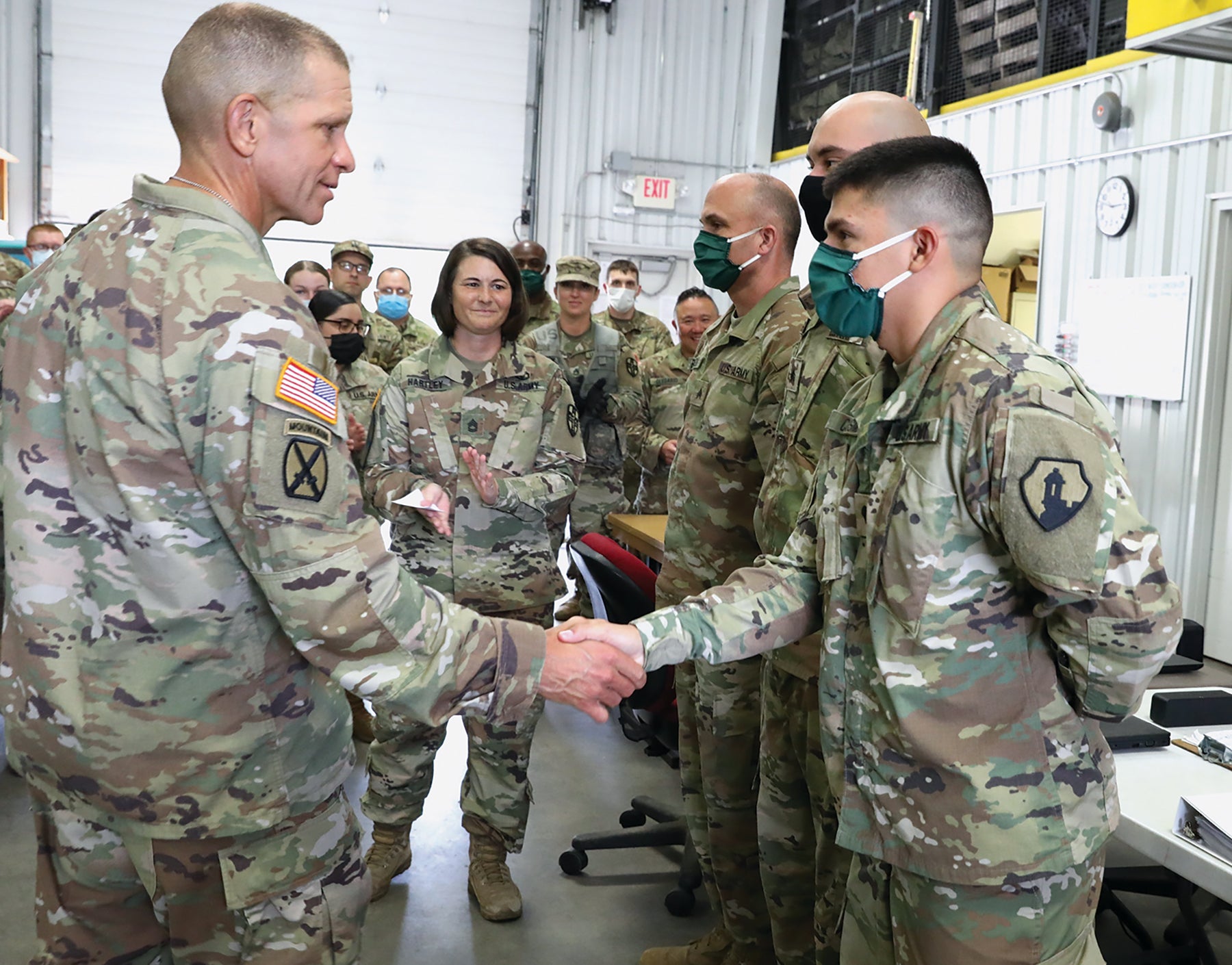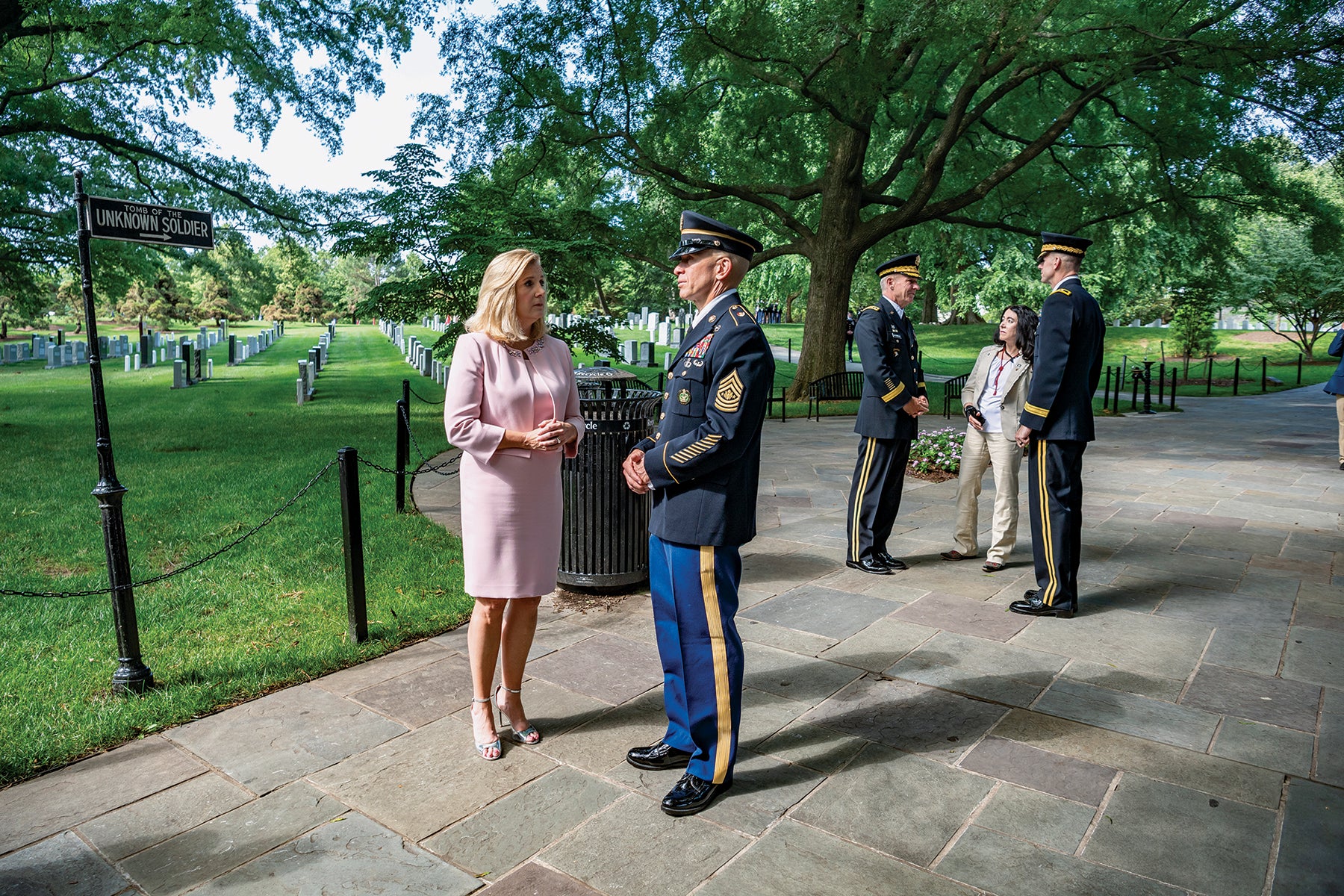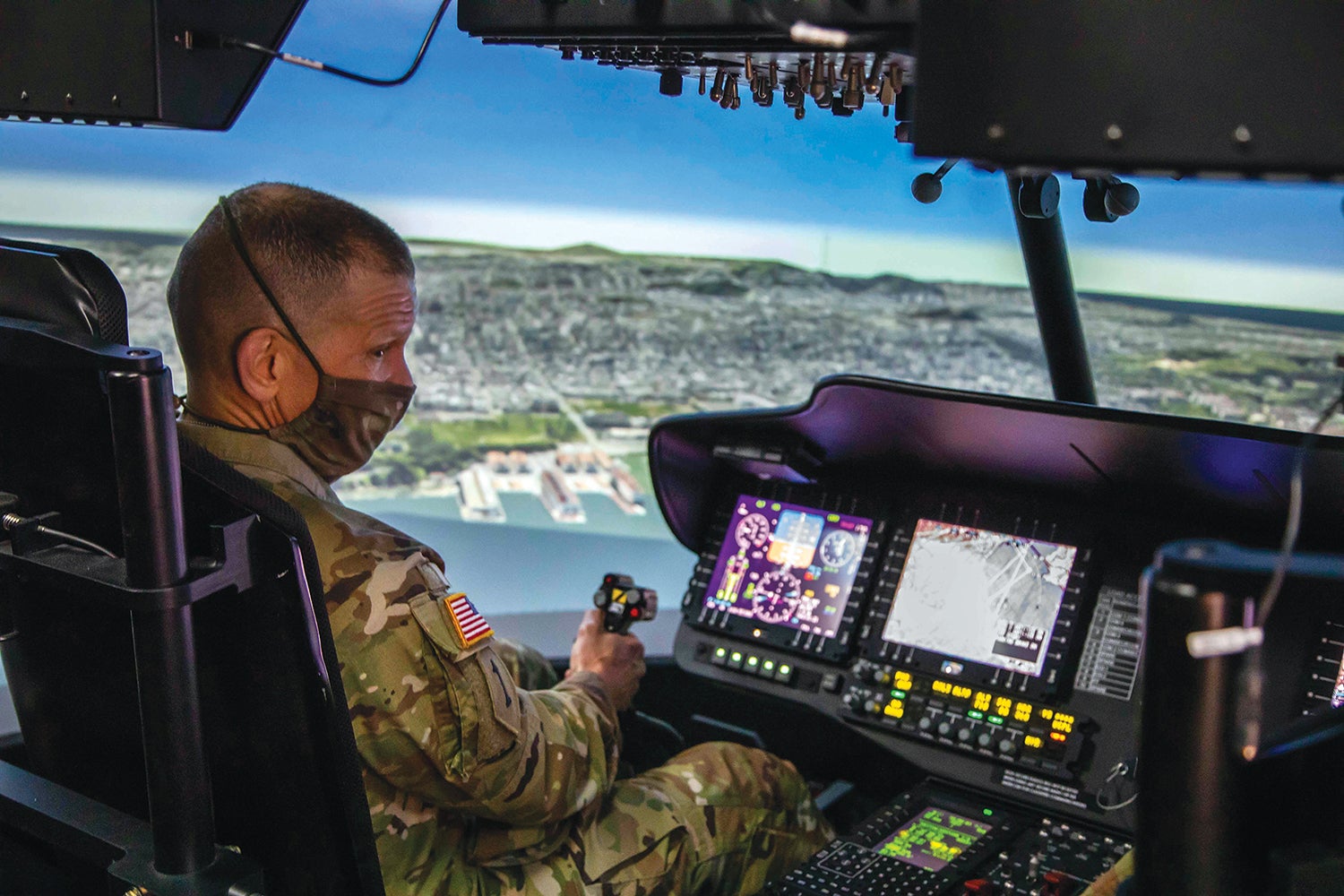Sgt. Maj. of the Army Michael Grinston is going back to the basics.
As he looks to pull soldiers together and move the force forward after a grueling year packed with missions at home and overseas and the lingering COVID-19 pandemic, Grinston said he believes it all starts with trust.
“How do we get through such a trying time?” he said. “You have a really tight, small group.”
If soldiers can trust their teammates, rely on them, confide in them, that’s the key to improving the Army, Grinston said. “We might get mad. It’s like a family, right? You fight with your family, but you still love them,” he said. “So, the blueprint, the base is still there, where we can say, ‘I know my squad and the people in my squad, and I know them so well that I won’t let anything happen to them.’”
Grinston, who became the Army’s senior enlisted leader on Aug. 9, 2019, said he knows it’s easier said than done, especially as he works to get the message to stick at the small-unit level. “What I wanted to do is change the culture of the Army, where everybody treats everybody as a part of a cohesive team that’s highly trained, disciplined and fit,” Grinston said.
Changing the Army’s culture is “the hardest, but I still think it’s the most important,” he said.
Grinston said he’s going to keep trying as long as he’s the sergeant major of the Army. “We’ve got to keep going. We’re not there yet. It’s clearly not,” he said, citing rising numbers of suicides and sexual assaults.
Keep Going
Last year was “a heck of a year,” Grinston said. As the country shut down because of the pandemic, the Army worked hard and fast to find a safe way to continue training. “We’d already decided that the Army has to keep going,” Grinston said. “We have to be ready to fight the nation’s wars. We still have to go to the National Training Center. We still have to have a ready Army.”
Leaders put in place health and safety measures and slowly resumed basic training and combat training center rotations. At the same time, soldiers were serving overseas and being called on to help with COVID-19 response at home. Soldiers, particularly those in the Army National Guard, were mobilized to support local authorities with civil unrest and protests across the country, all while responding to wildfires, hurricanes and floods. “What was unique for me last summer was, literally, the East Coast was flooding, and then the West Coast was on fire,” Grinston said.

As the Army regained its rhythm, the presidential election arrived, followed in December by the release of the devastating independent review of Fort Hood, Texas. “That was a trying time,” Grinston said. “There’s nothing good in the report. In my personal opinion, it’s all bad.”
The independent review, which was ordered by then-Army Secretary Ryan McCarthy after the murder of Spc. Vanessa Guillén, found a “deficient” command climate at Fort Hood, including ineffective implementation of the Army’s Sexual Harassment/Assault Response and Prevention program that resulted in a pervasive lack of confidence, fear of retaliation and significant underreporting of cases.
Conducted by a panel of five civilian experts, the review also found that Fort Hood leadership knew or should have known of the high risk of harm to female soldiers. Fourteen commanders and other leaders were relieved or suspended, and the Army created the People First Task Force to study and implement the recommendations from the report.
Improving Safety
Findings from the review reverberated across the Army, as did simmering tensions and emotional calls for inclusion after the May 2020 murder of George Floyd while in police custody in Minneapolis, leading to renewed efforts to improve soldiers’ safety, welfare and readiness.
Grinston said the Army continues to make progress on battling issues such as suicide and sexual assault and harassment. Just as important, the Army is working to hold leaders accountable, he said, adding that the independent review was something Army leaders wanted as they looked to make real, lasting change. “We directed those actions to be looked at. It was the leaders that said, ‘Hold leaders accountable,’ ” Grinston said.
Just as the Army thought it was turning a corner, rioters breached the U.S. Capitol on Jan. 6.
“We don’t decide elections,” Grinston said. “We support and defend the Constitution of the United States.” And that’s what the Army did, he said, when it mobilized thousands of National Guard troops to help law enforcement officials secure the Capitol and the Jan. 20 presidential inauguration.
“There’s nothing good that happened from Jan. 6,” Grinston said, but what the Army National Guard did was “phenomenal.”
Amid all the stress, uncertainty and busyness of the past year, there was good news, Grinston said.
For starters, scientists developed vaccines for COVID-19, and the Army played a key role in distributing the vaccines to the American public. Soldiers once again showed their resilience and dedication, and National Guard members continue to answer the call from their hometowns and states.
Army leaders also remain committed to improving soldiers’ and families’ quality of life, particularly in the areas of housing, health care, child care, spouse employment and permanent change-of-station moves, Grinston said.

Work to Do
But there still is work to do, Grinston said, and the Army—all three components, the Regular Army, Army National Guard and U.S. Army Reserve—remains busy, with no sign of things letting up.
Against that backdrop, as he often has during his tenure as sergeant major of the Army, Grinston again emphasized the importance of building solid, closely knit teams.
“That’s the future, is to continuously reinforce that,” he said. “If I’m a member of a cohesive team that is highly trained, disciplined and fit, I will be able to handle all this stuff better. If I don’t feel like I’m a part of a team, and there’s not a lot of trust, how do I get through something tough?”
Grinston knows it will take time and sustained effort to break through and change something as fundamental as Army culture, so he’s appealing to leaders across the Army. “We’re all part of a team. We’re all part of a squad.”
He’s particularly focused on reaching the Army’s staff sergeants. “Staff sergeants are kind of that linchpin rank, where we need like a billion more. We need a lot more of those,” Grinston said.
Staff sergeants, as well as other NCOs in the force, are small-unit leaders who have direct and outsized impact on soldiers’ lives and well-being. “A lot of bad things or good things can happen with that small-unit leader,” Grinston said.
To tackle that, the Army in October 2020 extended staff sergeants’ time-in-grade requirement for promotion, doubling it from 18 months to 36. “I know that’s a 100% increase; the staff sergeants remind me of this all the time,” he said. “But I wanted to give them enough time to know their people, and we want good small-unit leaders.”

As he’s spread the word about the importance of building cohesive teams and changing the Army’s culture, Grinston believes he’s made progress—especially at the brigade and battalion levels, where he and Army Chief of Staff Gen. James McConville have reinforced those lessons when they speak at pre-command courses. But there remains a “little disconnect” at the company and lower levels, he said.
He used as an example the Fort Hood independent review, which cited a lack of awareness of how to handle complaints of sexual assault or harassment. As a result, the review concluded that Fort Hood leaders tolerated sexual assault and harassment, Grinston said.
Senior leaders can talk exhaustively about their priorities, but junior leaders must put them into action, he said. “I had to say, ‘You’re waiting for me to define a cohesive team that’s highly trained and disciplined, and that is incorrect,’ ” Grinston said. “Everybody has a squad, and everybody is responsible for making sure this happens all the way down.”
Zero Tolerance
The goal is to eliminate harmful behaviors from the force, Grinston said. “We want to say we have zero sexual assault, zero sexual harassment, zero suicide,” he said. To tackle those issues, Grinston has brought together every senior Mission Command enlisted leader from across the Army. These senior NCOs meet monthly to share ideas and look for new, effective ways to address these problems.
“We’re going to take these ideas and not wait for another report or independent review,” Grinston said. “We’re going to look at it every month and say, ‘Is this working?’ And then we’re going to share that idea.”
For this to work, leaders must be willing to try new ideas and not get caught up in the data, Grinston said. “What do we always look at? We look at the people who had the most of the bad. What unit has the most DUIs? Instead, we don’t even take that chart and turn it around and say, ‘What unit has gone the longest without a DUI, and what are they doing?’ ”
To start, one idea the group is looking at is how to ease the transition for soldiers who are new to a unit—from new soldiers arriving at their first duty station to soldiers who are settling into their next assignment. “Those first 180 days are just a stressful time,” Grinston said. “You come to a new location, you’ve got a new house, you want to look for child care, you’ve got to get health care. So, how can we eliminate those stressors?”
Grinston wants to see if a smooth transition will translate into fewer suicides or incidents of sexual assault or harassment, or if soldiers will be less likely to get into trouble and instead be better set up for a successful assignment.
Grinston said he’s open to trying new ideas and picking up what works and ditching what doesn’t. “You’ve got to be able to be flexible enough to say, ‘Is it working or not?’”

